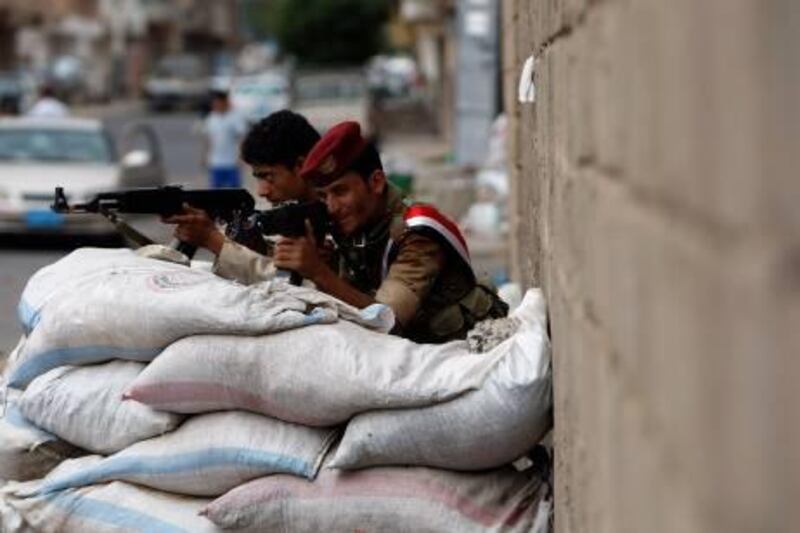SANA'A // The Yemeni president Ali Abdullah Saleh's troops attacked opposition tribesmen protecting protesters in the capital's main square yesterday in a third day of fighting.
Mr Saleh said he would try to keep the violence from "dragging the country into a civil war".
The fighting has left at least 70 dead and dozens badly injured since Monday.
Late last night, the government closed Sana'a airport because the fighting had moved very close. About 10pm, the airport was closed and flights were diverted to Aden.
Firing erupted at University Square as protesters demanding that Mr Saleh resign were guarded by troops led by General Ali Mohsen al Ahmar, who defected from Mr Saleh's army. Government artillery killed several tribal fighters.
Mr Saleh issued defiant statements as opposition troops took control of several government buildings. He said he would not step down or allow the country to become a failed state.
The president's response, read by his spokesman, suggested he was prepared to escalate the fight against the tribes who are fighting for Sheikh Sadeq al Ahmar, the leader of the Hashed tribe, the most powerful in the country. The sheikh is not related to the dissident general.
"I will not leave power and I will not leave Yemen," Mr Saleh said through his spokesman, Ahmed al Soufi. He also took a direct swipe at US-backed efforts to negotiate his exit: "I don't take orders from outside."
Nonetheless, the US offered clear instructions. "We call upon President Saleh to move immediately on his commitment to transfer power," the US president, Barack Obama, said in a joint press conference with the British prime minister David Cameron in London.
But Mr Saleh did not appear willing to comply. "Yemen will not be a failed state. It will not turn into al Qa'eda refuge," his statement said. Western nations are worried that the chaos in Yemen will strengthen an al Qa'eda offshoot there, al Qa'eda in the Arabian Peninsula.
The clashes began on Monday after Mr Saleh's troops tried to storm Sheikh al Ahmad's compound. Hundreds of tribal fighters responded and fighting has continued since.
The battles have ravaged the capital's Hassaba district, which contains government offices and the headquarters of Mr Saleh's ruling party. Some military units appear to have broken ranks and joined the opposition.
Tribesmen yesterday occupied the Saba News Agency compound, Yemen's main media building, and the Ministry of Tourism. At least five ministries have fallen into the hands of Hashed tribesmen, Mr Saleh's media adviser confirmed.
Referring to the tribal fighters, Mr al Soufi said: "They enter the capital and seize government ministries. They attack the people and cry at the same time. The international community must not watch and remain quiet."
The tribal troops seized the ministries of interior, education, trade and commerce, and local administration. Since Monday artillery attacks on the al Ahmar residence have have not stopped, while thousands of tribesmen continue pushing back government forces from coming near the home.
"We are defending ourselves and our leaders," said Shaef Abdul Jabbar, a Hashed tribesman. "We do not attack. We came to Sana'a when he [Sadeq] called for our help." The sheikh was once a Saleh ally but he switched his support to the protesters two months ago.
Tribes accuse the government of using the Saba News Agency building to store weapons. The chairman of the agency denies that and contends that al Ahmar supporters are lying to justify taking control of the government buildings.
"The tribes attacked Saba Agency with RPGs and heavy weaponry and took control of all the governmental institution surrounding the agency," said Tareq al Shami, the agency's chairman.
Security forces blocked the main entrances to Sana'a, fearing that more tribesmen would be on their way. Thousands of armed gunmen have entered the capital over the past three days.
The interior ministry called on civilians to evacuate areas near the Hassaba area. "We do not want civilians to pay the price of selfish acts of barbarians," said Abdu Ganadi, the government spokesman.
Sheikh al Ahmar's media office said tribesmen seized the buildings because the Republican Guards were using rooftops to attack tribal fighters. "They attack us in our homes from the rooftops of these ministries and institutions," said Abdul Qawi al Qaisi, the head of Sheikh al Ahmar's office.
"We seize these buildings to ensure they are not used to kill the Yemeni people, and we will hand them over to the revolution youth."
Young protesters denounced the attacks on Sheikh al Ahmar's residence and vowed to continue protesting. They insisted their protests were peaceful.
Hundreds of thousands of protesters marched yesterday in 17 of Yemen's 21 provinces, demanding that Mr Saleh step down. "The government wants to show the world that our revolution is violent. We tell them no, it is peaceful and will always be peaceful," said Khaled Anesi, a leading youth protester.
Abdul Latif al Zayani, Secretary General of the Gulf Cooperation Council, expressed his willingness yesterday to return to Sana'a if it will lead to Mr Salah signing the GCC proposal. The GCC froze its proposal last week after Mr Saleh failed to sign.
Activists and representatives of civil society organisations in Yemen marched to the UAE Embassy in Sana'a yesterday to deliver a letter of apology and a wreath of roses, "as a token of appreciation for the UAE", according to WAM, the UAE state news agency.
The gesture demonstrated regret for Sunday's assault on the UAE embassy in Sana'a by supporters of Mr Saleh. Men armed with knives, pistols and machineguns surrounded the embassy while UAE, GCC and western diplomats, as well as Mr al Zayani, were inside discussing a peace deal. No one was injured, but Mr al Zayani and six ambassadors had to be rescued from the embassy by helicopter.
On Monday, Mr Saleh called Sheikh Khalifa, President of the UAE, to apologise personally.
* With additional reporting by the Associated Press, Agence France-Presse and National reporter Hala Khalaf





